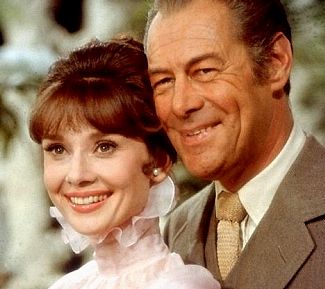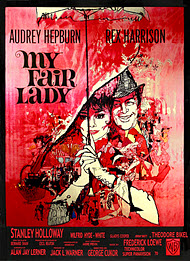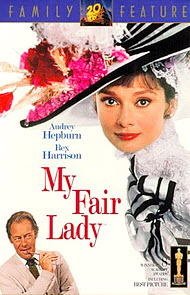My Fair Lady
Reviewed by: Brett Willis
STAFF WRITER
| Moral Rating: | Good |
| Moviemaking Quality: |
|
| Primary Audience: | Older Child to Adult |
| Genre: | Musical Drama |
| Length: | 2 hr. 50 min. |
| Year of Release: | 1964 |
| USA Release: |
December 25, 1964 (wide release) |
| Featuring |
|---|
|
Audrey Hepburn … Eliza Doolittle Rex Harrison … Professor Henry Higgins Stanley Holloway … Alfred P. Doolittle Wilfrid Hyde-White … Colonel Hugh Pickering Gladys Cooper … Mrs. Higgins Jeremy Brett … Freddy Eynsford-Hill Theodore Bikel … Zoltan Karpathy Mona Washbourne … Mrs. Pearce Isobel Elsom … Mrs. Eynsford-Hill John Holland … Butler |
| Director |
|
George Cukor |
| Producer |
|
Warner Bros. Jack L. Warner |
| Distributor |
This film and “The Sound of Music” were produced at about the same time, won Best Picture Oscars in consecutive years and are still marketed in parallel by Fox Video. Of the two, this Lerner and Loewe musical is a little more daring in its content, but on the whole quite enjoyable.
Henry Higgins (Rex Harrison), a linguist who supposedly can tell by accent what section of London a person was raised in, bets that he can “retrain” the poor flower-vendor girl Eliza Doolittle (Audrey Hepburn) and pass her off as a noble at a snobbish party. Throughout most of the film, Higgins has only a cold experimental interest in Eliza, not a personal one; but of course things can change. There’s someone else who’s also interested in Eliza, and his song “On the Street Where You Live” is my personal favorite from this film.
There’s no profane content as is found in more modern films, but there’s some subject matter that could be a problem for young children. Eliza’s father is a strange duck-a philosophical professional sponge (thus the song line: “With a little bit of luck you’ll never work”) who wouldn’t want a large windfall of money all at once lest he become different from his fellow sponges, and who lives with a woman outside of marriage. Higgins has been a hard, unfeeling person; but working with Eliza eventually changes him more than it does her. Besides the other adult themes prominent in the film, there’s the concept of class-based prejudice (which Eliza’s “retraining” is designed to defeat).
The 1938 film version of George Bernard Shaw’s play “Pygmalion,” the original, non-musical version of this story, starring Leslie Howard (“Gone With the Wind”) and Wendy Hiller, is also available on video and is a very good rendition (a Best Picture nominee).







